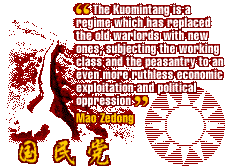|
|
 |
  |
|
|
The original Kuomintang nationalists called for parliamentary democracy and moderate socialism as imperial rule waned in the first years of the century. Initially in coalition with the Communists, Kuomintang forces established government in Nanjing in 1928. But the regime was plagued by bureaucratic inefficiency and corruption. Chiang Kai Shek never fully consolidated control at the local level - rival warlords still wielded provincial power. Busy with civil war and the threat from Japan, the Kuomintang failed to remove such threats from the peasant population. Civil conflict came to a head in China after World War II, and the Red Army pushed the Kuomintang from the mainland. The nationalists fled to Taiwan and set up a government there, which retained China's seat in the United Nations and the Security Council until 1971. |